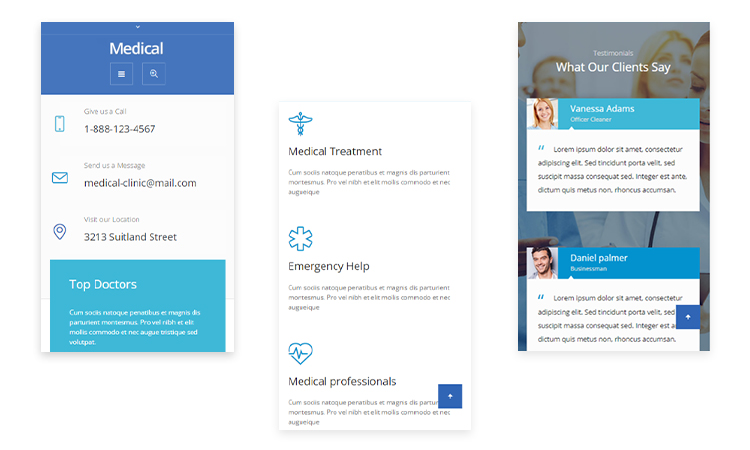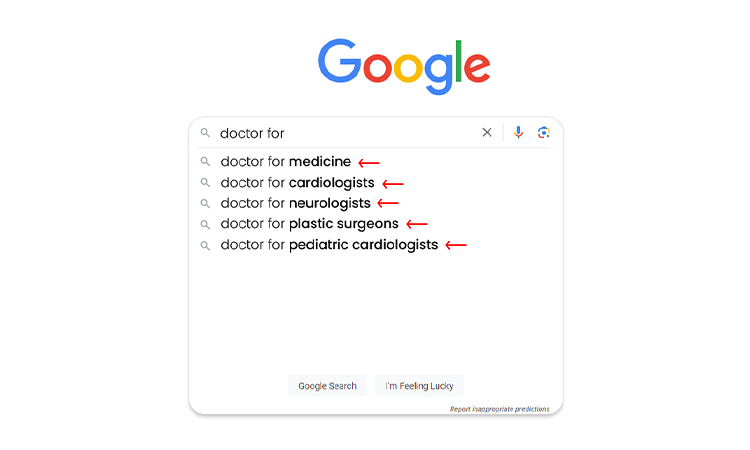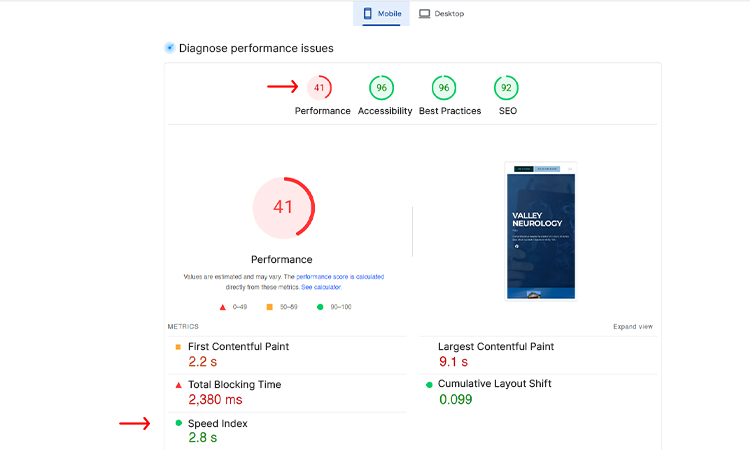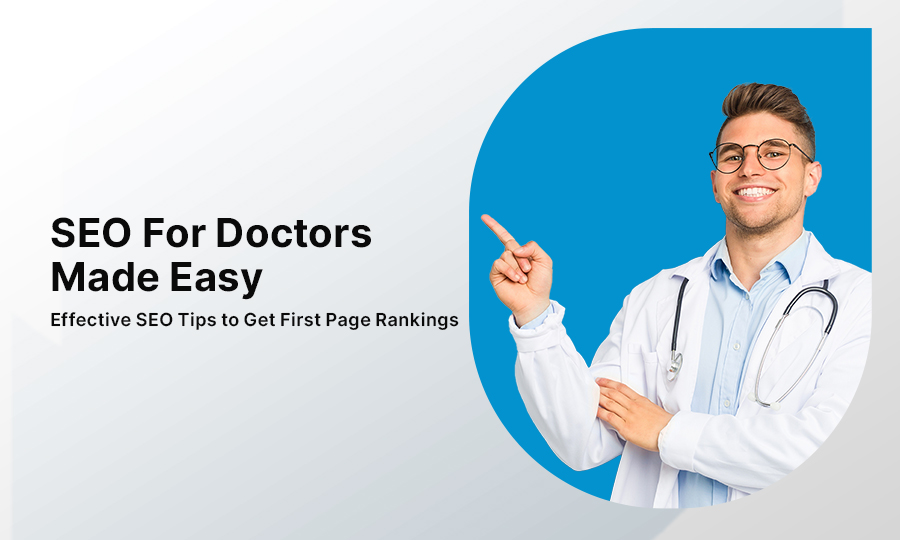Having a degree from a prestigious medical school, or years of experience can count to nothing if you don’t have enough patients. This can happen due to a lack of online visibility that many other doctors are taking advantage of. SEO for doctors helps them spread their reach outside their immediate vicinity. It is a cost effective marketing practice that allows doctors to rank better on the organic search results.
What is SEO for Doctors?
Doctor’s SEO entails practices like keyword research, crafting high-quality content, social media optimization, acquisition of high quality backlinks, and more. Implementing these SEO strategies helps websites get a higher ranking on the search results.
SEO is instrumental in building trust and credibility with potential patients. As a result, SEO can be an essential tool for doctors looking to attract new patients and build their practices.
3 Benefits of SEO for Medical Practices
A doctor trying to establish a hold on the online realm should certainly wield SEO from the arsenal. While there are a lot of benefits to SEO for doctors, However, let us take a look at the three primary benefits that healthcare professionals can get from search engine optimization of their website;
- Higher Visibility
Applying SEO to your website allows web crawlers to crawl through your website easily. SEO-friendly practices like mobile optimization, minimizing page loading time, and on-page SEO optimization help the doctor’s website rank higher.
- Get More Patients
With a better ranking, a website is more discoverable because of its higher visibility. As patients tend to trust search results, a good level of search engine optimization helps healthcare facilities get more patients.
- Enhances Credibility & Trust
SEO for medical practice uses high quality content, links from authoritative websites and focuses on bolstering the engagement metrics. All these combined establish the site as a credible source that users can trust.
10 Powerful Tips to Boost SEO for Doctors
Search engine optimization for healthcare professionals is a vast avenue with superb benefits. However, you will have to know the right channels to leverage to reap the maximum rewards.
Let’s take a look at some of the best strategies on medical practice SEO to help boost domain authority, rankings, and patient conversions;
- Design a User-Friendly Website

The website is the face of your healthcare practice, the better the website is, the more patients will be attracted to book an online appointment. Hence, it is imperative you create the best possible website you can to attract patients.
For starters, a doctor’s website should look professional. It should convey all the details and yet be precise enough so as not to tax the website visitors with mountains of information. Besides this, the website should have a user-friendly layout with easy access to navigational tabs.
Your decisions can make it look like a blob or it can be smart as a whip, it all depends on your selection of the website design. As it is such an important factor in the successful journey of SEO for doctors, aim to achieve perfection.
Google, along with other search engines, takes website responsiveness, mobile-friendliness, and ease of navigation into account. According to data, only 80% of websites are designed for mobile devices. Hence, designing a website keeping in mind all screens is vital.
How to Design a User Friendly Website?
- Website layout should be user friendly
- Make mobile optimization a priority
- Choose the website color scheme carefully
- Ensure users have easy access to navigational tabs
- Take a While for keyword Research

SEO is not a process that you can start in a day, especially when we are talking about doctor’s SEO. It needs planning, process, and execution. Part of the plan to expand a doctor’s reach is keyword research. It is digging up relevant keywords that match the search queries of your target audience. It is the spinal chord on which search engine optimization stands.
While doing SEO for doctors, it is vital to target keywords with care and caution. See, there are innumerable keywords that can yield results for your medical practice. But you need to have a big domain for it. If you are starting off new, your website will not hold the authority that is necessary to target highly competitive keywords like ‘best general physician’ or’ best surgeon’.
If this is the case, you can target long tail keywords that are not as competitive and yet have search volumes. Some examples of these keywords for doctors are dentists for immediate bookings, best urgent care unit near me“.
Try using keyword research tools like Google Keyword Planner, Ahrefs or SEMrush. These are premium tools that can search keywords according to your goal in a matter of seconds.
How to Find Relevant Keywords for Doctors?
- Assess the search intent of the target audience
- Brainstorm seed keywords
- Optimize the website with long tail keywords
- take keyword difficulty into consideration
- Target keywords should have a sizable volume
- Content Marketing (Focus on Quality!)

Content marketing refers to creating written and visual content to involve the target audience’s interest. The platform of publishing can be both on the website and outside of the website. It entails a range of techniques, like crafting engaging videos, infographics, podcasts, webinars, etc., that causes traction on the search engine results.
There are medical practitioners who limit the scope of the avenue to written content on their websites. However, this should not be the case with physicians who aim to channel website traffic from multiple sources.
A section on high quality blog posts is one of your most valuable website assets. Each blog post you write should offer value to the readers.
But do you know what works best? Emails!
Induce email marketing as a part of your content marketing strategy. This is important because emails have an average 25% to 41% open rate.
Apart from that you can create educational eBooks that educate the readers on important healthcare tips. Creating medical brochures can also be helpful. It establishes a professional approach while giving an overview of your practice.
The main benefit of this SEO channel is that it popularizes your name as a doctor because of its vast reach.
However, let us tell you in advance that content marketing can be a time consuming process. If you have the time to work on content marketing for doctors, congrats, you have saved yourself quite some bucks. If not, look for an adept content marketing agency who can take up the task.
Best Content Marketing Forms for Doctors
- Emails
- Social media posts
- medical eBook
- Brochures
- Press releases
- On Page SEO for Doctors

On page SEO for doctors and healthcare professionals entails a gamut of optimization efforts that are visible on the website itself. In fact, skipping on page optimization is not an option, if you want to rank on the search results!
For starters, you can create some stunning website landing pages. There should be one for every service you offer. For instance, there should be a page on dental extraction, root canals, dentures, oral cleaning, etc, when optimizing SEO for dentists. The more service pages you have, the better.
A study suggests that medical websites with 10 to 12 service pages have a 55% higher lead generation probability.
Other essential elements in medical practice SEO are meta tags and meta descriptions. The former consists of the title of the page. This is the same title that you see in blue on the search results. As for meta descriptions, write them under 160 characters and optimize them with keywords.
An interesting way to approach meta description is by writing the core USPs of your service about each of the web pages. It attracts visitors and takes the CTR through the roof.
H tags, also form an essential part of on page SEO optimization. These are HTML tags that give structure to the content. Without H tags, your content comes across as a big block of etc. to the web crawlers. As it has various little elements, taking care of it all at a time can be a bit of a hassle for a doctor. You can also opt to choose a healthcare SEO company that has experience in the niche.
How do you optimize On-page SEO for doctors?
- Maintain a landing page for each of your services
- Use cutting-edge metadata
- Optimize on page content with keywords
- Structure content with H tags
- Local SEO Boosts Rank on the Area Specific Search Results

Local SEO for doctors is a marketing strategy that enhances the ranks of a medical practice website on the local search engines.
Unless you are a renowned doctor who travels the world to treat rich international patients, local SEO is extremely important to you. Especially if you are freshly minted out of a medical school, formulating a successful campaign is crucial to ranking well on the local Google search results.
Although national SEO campaigns can generate tons of traffic, they may not be as effective for medical practices, especially if you are looking for footfall in your clinic. This is because people searching for healthcare services usually search for something specific, such as a “family doctor near me” or “pediatrician in Omaha’’, etc. And to rank for such keywords you have to optimize local SEO for doctors.
46% of Google searches are based on locations, which makes local SEO efforts a high yielding avenue.
Google business profile is one of the core aspects of optimizing local SEO for doctors. GBP is a free platform that is available for all business and private practitioners, but you have to claim it first.
Optimize the GMB with the name of your clinic, location, and contact details. Mention your practice hours. In case you practice in more than one location, it is essential to optimize Google maps for both the locations for easy navigation of patients.
44% of people searching for local services clicked on the Google local pack. As a doctor trying to set foot in a locality, your objective should be to rank in the Google Local 3 pack. These are the results that appear on Google when someone makes a location based search.
Checklist for Local SEO for Physicians
- Optimize the website with local keywords
- Acquire local backlinks
- Claim Google Business profile for better visibility on the local search results
- Optimize Google maps
- Technical SEO for Healthcare Professionals Enhances Online UX

Technical SEO entails all practices that make it easier for the search engines to find, crawl, and index your web pages. You can start with a technical audit of the website to track the inconsistencies
Technical SEO for doctors is one of the most crucial aspects of Doctor’s SEO. It comprises an array of factors that might require the knowledge of an SEO expert. However, if you are a multi talented healthcare professional, who is adept at handling both, you can do this with ease.
There are two major aspects here in technical optimization of a website. The first is mobile optimization, and the second is page speed minimization,
According to data 58.67% of the whole internet traffic comes from mobile devices. If you take the sheer number into consideration, you will know the importance of A-game mobile optimization for your website. Apart from this, Google, the search engine giant, does mobile-first indexing. It means that websites with top-notch mobile interfaces will be indexed first.
Try using a responsive design for your website instead of an adaptive setup. It makes your task easier. A responsive design ensures that the website fits different screen sizes without any choppiness or lag.
Page speed optimization is crucial to another plane! Statistics suggest that the bounce rate increases by 32% when the page loading time shoots up from 1 to 3 seconds.
Other factors you should take into consideration while optimizing SEO for doctors are secured socket layout, robot.txt.usages, getting rid of duplicate content, checking for broken links, and fixing them.
Checklist for Technical SEO for Doctors
- Use a responsive design
- Check website core web vitals
- Fix broken links
- Use canonical tags for duplicate content
- Implement Social Media Optimization For Better Online Visibility

An average individual spends about 143 minutes a day on social media. This means that people are spending more than 2 hours a day scrolling random feeds. As a doctor trying to set foot in the healthcare industry, you should leverage it and try squeezing a post or two about your medical practice into the feed of your target audience.
Social media optimization for doctors means using an array of social platforms for publicity. It involves all basic social media practices, such as updating the basic information of the medical practice, contact details, images, etc. It also includes posting frequently on social media and engaging with potential audiences in the comment section. You can also use relevant hashtags for your posts to broaden the reach.
See, it is not necessary that every person in your target audience will be active on all social media platforms.
Hence, you need a multi-way process to get this done. You can surely start by creating a basic Facebook business page. However, you have to amp up doctor’s social media marketing by being active on mainstream social platforms like Instagram, LinkedIn, YouTube, etc.
While social media signals such as shares, comments, and likes are not direct ranking factors of search engine optimization, nonetheless a strong social presence can have a positive impact on SEO for doctors.
Enhanced distribution of content on social channels bolsters the bandwidth of your visibility. Also, a higher number of shares on social platforms helps medical practice websites acquire natural links, rendering credibility to the site.
You can as well amp up the organic traffic volume simply by mentioning the link to your website in the bio. It paves way for potential patients to reach your website by clicking on the link.
How to do Social Media Optimization for Doctors?
- Create accounts on all major social media accounts
- Optimize the social accounts with basic information about the medical practice
- Upload pictures of your clinic
- Post frequently
- Engage in the comment box
- Deal with negative comments with poise
9. Focus on Earning & Acquiring Backlinks

Although backlinks have taken a backseat in the SEO game, they are an important factor for ranking on the search results.
Most doctors bank on guest posting to create a solid backlink portfolio. But trust us, you can do better. Focus on natural link-building instead. You can earn links if you rank high enough on the search engine results pages. The only way to do this is to create top-notch content that people find valuable.
Creating high-value content not only establishes you as an authoritative source but also serves as a powerful tool for earning backlinks naturally.
Of course, you can engage in guest posting to solidify your portfolio. But be cautious about the quality of the domain you are linking to. Try keeping all the domains related to medical practices. Also, try linking your website with at least 35 DA for better results. It helps web crawlers scan and index your web pages quickly.
In the whole gamut of SEO for doctors, link building takes the most time. You have to wait for a considerable time for a solid backlink portfolio, especially if you are starting off with a new website. Note that a few honest mistakes can lead to a penguin penalty. Hence, if you have some budget, try taking the help of a good link building company, at least in the initial phase.
Checklist for Building a Robust Backlink Portfolio:
- Focus on natural link building
- Acquire links with higher domain authority
- Obtain high quality backlinks from relevant site
- Avoid haste in the process
10. Leverage Third-Party Reviews to Establish Trust

Most successful doctors who have marketed online with effective SEO strategies have made the best of patient reviews and testimonials. 93% of people opine that online reviews impact decisions before they visit a business. Hence, marketing user-generated content is extremely important for healthcare providers.
Search engines understand these to be true accounts of your patients’ experiences in your clinic. When crawlers find positive online reviews about your practice, they send a positive signal to search engines, which translates to better SEO ranking for doctors’ websites.
Online reviews have become an essential part of healthcare marketing. Not only does it help healthcare professionals get new patients, but also have a major contribution in patient retention.
There are two ways you can leverage this channel. The first is by manually asking every patient to rate your practice after the treatment is over. The second way is to implement SMS and email automation.
market these patient reviews on multiple platforms to get more patients to your clinic. However during the process, do ensure that you are in strict adherence with the HIPAA regulations to avoid complications.
If you are too tied to boosting your services as a doctor, you can also take a third route. Hire a PR company that can do all the brain work of networking within the industry and boosting your reputation as an established doctor in the healthcare industry.
11. Boost the EEAT Signals of Your Website

EEAT is the Google quality rater guidelines that the search engine rolled out in the year 2014.The original version of EEAT was ‘EAT’. It stood for experience, authoritativeness, and trustworthiness. However, in 2022 with an extra ‘E’ added in the original version, Google toughened the game. As Websites now have to demonstrate their expertise in the field along with the former three criteria.
As a doctor, your website is essentially YMYL in nature. And if you want to up the game, it is important to avoid Google medic at all costs.
Hence, publish original content on your website by people who have expertise on the subject matter. Ensure that you are not in breach with any of the guidelines and maintain quality.
How to Level Up EEAT Signals?
- Ensure the website uses the author schema
- Create genuine author pages
- Contact information should be accessible
FAQs
Some of the most common mistakes to avoid with SEO for medical practices are under optimization of image alt tags, ignoring broken links, not using canonical tags for duplicate content, and not-minimizing page loading time.
Certainly, doctors can implement SEO for their websites. If a healthcare professional is well aware of SEO practices, then optimizing a website should be a cakewalk for them.
SEO is a pocket-friendly marketing tactic that requires more time than money. The cost of SEO for medical practice depends on the scale of your practice. If you have a website with many landing pages, the optimization cost will be higher than a site with fewer web pages.
Getting the help of a healthcare SEO company is a wise choice. These companies have some of the top-minds who specialize in search engine optimization for doctors. They can help you with critical processes like acquiring backlinks, getting top-ranks, and designing an SEO campaign that facilitates patient conversions.
Wrapping Up
SEO for doctors takes time. However, it is worth every effort as healthcare SEO gives sustainable results. If you are willing to pursue a career in the medical field, garnering the favor of search engines through SEO best practices is one of the best and most cost effective channels you can leverage.
If you are a multi-talented person who knows how to do the best of both SEO and Medicine/ surgery, it is great for you. In this case, you can relish designing and managing your own website. However, if you are new to SEO, it is perhaps better to hire a healthcare marketing company, as SEO for healthcare professionals has various ethical considerations, and you cannot afford to go wrong.
Additional Resources:
- The Ultimate Guide to Online Reputation Management for Doctors
- Advanced Lead Generation Strategies for Doctors and Healthcare Providers
- Content Marketing for Doctors: How to Educate and Engage Patients?
- PPC for Doctors: The Ultimate Guide to Generating Online Leads
- Social Media Marketing for Doctors: A Step-by-Step Approach
- Digital Marketing for Healthcare: Top 6 Strategies for Online Success

